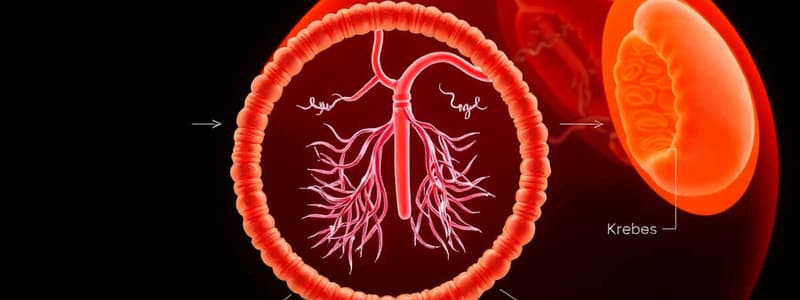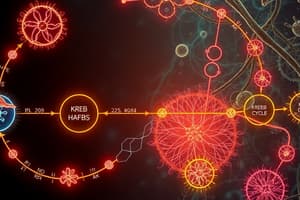Podcast
Questions and Answers
What is a potential consequence of deficiencies in enzymes involved in the Krebs cycle?
What is a potential consequence of deficiencies in enzymes involved in the Krebs cycle?
- Accumulation of toxic intermediates (correct)
- Increased efficiency in energy production
- Enhanced synthesis of amino acids
- Improved metabolic flexibility
Which of the following symptoms may indicate a disruption in the Krebs cycle?
Which of the following symptoms may indicate a disruption in the Krebs cycle?
- Improved muscle performance
- Increased growth rate
- Sudden weight loss
- Neurological problems (correct)
How does the Krebs cycle relate to other metabolic pathways?
How does the Krebs cycle relate to other metabolic pathways?
- It exclusively synthesizes glucose
- It acts as a connector between carbohydrate and protein metabolism (correct)
- It solely oxidizes fatty acids
- It initiates lipid biosynthesis exclusively
What does the Krebs cycle primarily receive from glycolysis?
What does the Krebs cycle primarily receive from glycolysis?
Why is understanding the Krebs cycle important for treating metabolic diseases?
Why is understanding the Krebs cycle important for treating metabolic diseases?
What is the primary role of the Krebs cycle in cellular respiration?
What is the primary role of the Krebs cycle in cellular respiration?
Which molecule combines with acetyl-CoA to initiate the Krebs cycle?
Which molecule combines with acetyl-CoA to initiate the Krebs cycle?
Which of the following is a direct product of one cycle of acetyl-CoA processing?
Which of the following is a direct product of one cycle of acetyl-CoA processing?
What effect do high levels of ATP have on the Krebs cycle?
What effect do high levels of ATP have on the Krebs cycle?
How many carbon dioxide molecules are produced per cycle of the Krebs cycle?
How many carbon dioxide molecules are produced per cycle of the Krebs cycle?
What kind of reactions are involved in the Krebs cycle?
What kind of reactions are involved in the Krebs cycle?
What is a significant role of the Krebs cycle beyond energy production?
What is a significant role of the Krebs cycle beyond energy production?
What is the significance of the continuous regeneration of oxaloacetate in the Krebs cycle?
What is the significance of the continuous regeneration of oxaloacetate in the Krebs cycle?
Flashcards
Krebs Cycle
Krebs Cycle
A series of enzyme-catalyzed reactions in the mitochondria that extracts energy from acetyl-CoA, produced from the breakdown of carbohydrates, fats, and proteins.
Acetyl-CoA
Acetyl-CoA
A molecule formed from the breakdown of carbohydrates, fats, and proteins that enters the Krebs Cycle.
Citrate Formation
Citrate Formation
The combination of acetyl-CoA and oxaloacetate, marking the beginning of the Krebs Cycle.
NADH and FADH2
NADH and FADH2
Signup and view all the flashcards
ATP
ATP
Signup and view all the flashcards
Cellular Respiration
Cellular Respiration
Signup and view all the flashcards
Anabolic Intermediate Production
Anabolic Intermediate Production
Signup and view all the flashcards
Regulation of the Krebs Cycle
Regulation of the Krebs Cycle
Signup and view all the flashcards
What is the Krebs cycle?
What is the Krebs cycle?
Signup and view all the flashcards
What happens when Krebs cycle enzymes are deficient?
What happens when Krebs cycle enzymes are deficient?
Signup and view all the flashcards
How is the Krebs cycle linked to other metabolic pathways?
How is the Krebs cycle linked to other metabolic pathways?
Signup and view all the flashcards
Why is understanding the Krebs cycle important for human health?
Why is understanding the Krebs cycle important for human health?
Signup and view all the flashcards
Why is understanding the Krebs cycle important?
Why is understanding the Krebs cycle important?
Signup and view all the flashcards
Study Notes
Overview of the Krebs Cycle
- The Krebs cycle, also known as the citric acid cycle, is a vital metabolic process occurring in the mitochondria of eukaryotic cells.
- It's a series of chemical reactions extracting energy from acetyl-CoA, derived from the breakdown of carbohydrates, fats, and proteins.
- The cycle is central to cellular respiration, extracting energy-rich electrons from organic molecules for the electron transport chain.
- The cycle begins with the combination of acetyl-CoA and oxaloacetate to form citrate.
Key Steps of the Krebs Cycle
- The cycle progresses through eight distinct enzyme-catalyzed reactions.
- Each intermediate is a substrate for the next enzyme reaction.
- Each step involves the release or consumption of small molecules like water or CO2.
- These reactions yield ATP, NADH, and FADH2, used in the electron transport chain for ATP production supporting cellular functions.
Products of the Krebs Cycle
- Per acetyl-CoA processed:
- 3 NADH (electron carriers)
- 1 FADH2 (electron carrier)
- 1 ATP (directly produced)
- 2 CO2 (waste product)
- The cycle regenerates oxaloacetate to accept more acetyl-CoA molecules.
Importance of the Krebs Cycle
- The Krebs cycle is crucial for cellular energy production through cellular respiration.
- It produces vital intermediates for anabolic pathways like amino acid, lipid, and other molecule synthesis.
- The cycle is essential for metabolism, breaking down carbohydrates, fats, and proteins for ATP.
- It provides building blocks (intermediates) for the synthesis of non-essential amino acids and other molecules.
Regulation of the Krebs Cycle
- The Krebs cycle is regulated by substrate, product levels and cellular needs.
- Regulatory enzymes respond to energy charge (ATP/ADP ratio) and substrate availability.
- High ATP and NADH inhibit the cycle, signaling sufficient energy and excess electrons.
Clinical Significance
- Krebs cycle dysfunctions lead to metabolic disorders.
- Deficiencies in enzymes cause toxic intermediate build-up and vital cofactor depletion, harming energy production.
- Conditions impacting the cycle manifest as muscle weakness, poor growth, and neurological problems.
- Understanding the cycle is crucial for treatments of enzyme deficiencies and metabolic diseases.
Relationship to other Metabolic Pathways
- The Krebs cycle connects with other metabolic pathways.
- It receives acetyl-CoA from glycolysis (carbohydrates) and fatty acid oxidation (fats).
- It provides precursors for amino acid, porphyrin, and other molecule synthesis.
- The cycle is a key link between carbohydrate, fat, and protein metabolism.
Studying That Suits You
Use AI to generate personalized quizzes and flashcards to suit your learning preferences.




